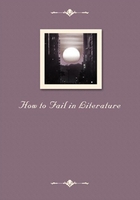
第4章 HOW TO FAIL IN LITERATURE(3)
"Hubert was determined to energetically and on all possible occasions,oppose any attempt to entangle him with such."Here,it will be noticed,"such"is used as a pronoun,a delightful flower of speech not to be disregarded by authors who would fail.But some one may reply that several of our most popular novelists revel in the kind of grammar which I am recommending.This is undeniable,but certain people manage to succeed in spite of their own earnest endeavours and startling demerits.There is no royal road to failure.There is no rule without its exception,and it may be urged that the works of the gentlemen and ladies who "break Priscian's head"--as they would say themselves--may be successful,but are not literature.Now it is about literature that we are speaking.
In the matter of style,there is another excellent way.You need not neglect it,but you may study it wrongly.You may be affectedly self-conscious,you may imitate the ingenious persons who carefully avoid the natural word,the spontaneous phrase,and employ some other set of terms which can hardly be construed.You may use,like a young essayist whom I have lovingly observed,a proportion of eighty adjectives to every sixty-five other words of all denominations.You may hunt for odd words,and thrust them into the wrong places,as where you say that a man's nose is "beetling,"that the sun sank in "a cauldron of daffodil chaos,"and the like.
{2}You may use common words in an unwonted sense,keeping some private interpretation clearly before you.Thus you may speak,if you like to write partly in the tongue of Hellas,about "assimilating the ethos"of a work of art,and so write that people shall think of the processes of digestion.You may speak of "exhausting the beauty"of a landscape,and,somehow,convey the notion of sucking an orange dry.Or you may wildly mix your metaphors,as when a critic accuses Mr.Browning of "giving the irridescence of the poetic afflatus,"as if the poetic afflatus were blown through a pipe,into soap,and produced soap bubbles.This is a more troublesome method than the mere picking up of every newspaper commonplace that floats into your mind,but it is equally certain to lead--where you want to go.By combining the two fashions a great deal may be done.Thus you want to describe a fire at sea,and you say,"the devouring element lapped the quivering spars,the mast,and the sea-shouldering keel of the doomed Mary Jane in one coruscating catastrophe.The sea deeps were incarnadined to an alarming extent by the flames,and to escape from such many plunged headlong in their watery bier."As a rule,authors who would fail stick to one bad sort of writing;either to the newspaper commonplace,or to the out of the way and inappropriate epithets,or to the common word with a twist on it.
But there are examples of the combined method,as when we call the trees round a man's house his "domestic boscage."This combination is difficult,but perfect for its purpose.You cannot write worse than "such."To attain perfection the young aspirant should confine his reading to the newspapers (carefully selecting his newspapers,for many of them will not help him to write ill)and to those modern authors who are most praised for their style by the people who know least about the matter.Words like "fictional"and "fictive"are distinctly to be recommended,and there are epithets such as "weird,""strange,""wild,""intimate,"and the rest,which blend pleasantly with "all the time"for "always";"back of"for "behind";"belong with"for "belong to";"live like I do"for "as I do."The authors who combine those charms are rare,but we can strive to be among them.
In short,he who would fail must avoid simplicity like a sunken reef,and must earnestly seek either the commonplace or the bizarre,the slipshod or the affected,the newfangled or the obsolete,the flippant or the sepulchral.I need not specially recommend you to write in "Wardour-street English,"the sham archaic,a lingo never spoken by mortal man,and composed of patches borrowed from authors between Piers Plowman and Gabriel Harvey.A few literal translations of Icelandic phrases may be thrown in;the result,as furniture-dealers say,is a "made-up article."
On the subject of style another hint may be offered.Style may be good in itself,but inappropriate to the subject.For example,style which may be excellently adapted to a theological essay,may be but ill-suited for a dialogue in a novel.There are subjects of which the poet says Ornari res ipsa vetat,contenta doceri.
The matter declines to be adorned,and is content with being clearly stated.I do not know what would occur if the writer of the Money Article in the Times treated his topic with reckless gaiety.
Probably that number of the journal in which the essay appeared would have a large sale,but the author might achieve professional failure;in the office.On the whole it may not be the wiser plan to write about the Origins of Religion in the style which might suit a study of the life of ballet dancers;the two MM.Halevy,the learned and the popular,would make a blunder if they exchanged styles.Yet Gibbon never denies himself a jest,and Montesquieu's Esprit des Lois was called L'Esprit sur les Lois.M.Renan's Histoire d'Israel may almost be called skittish.The French are more tolerant of those excesses than the English.It is a digression,but he who would fail can reach his end by not taking himself seriously.If he gives himself no important airs,whether out of a freakish humour,or real humility,depend upon it the public and the critics will take him at something under his own estimate.On the other hand,by copying the gravity of demeanour admired by Mr.Shandy in a celebrated parochial animal,even a very dull person may succeed in winning no inconsiderable reputation.